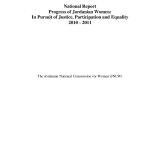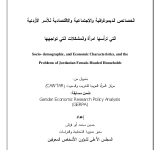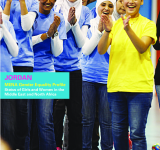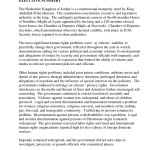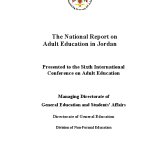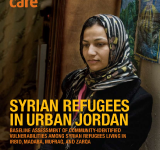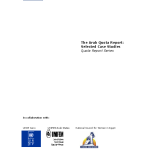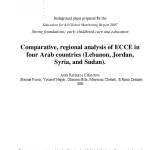This national report is designed to trace the progress of women in various fields;; monitoring achievements;; and highlighting gaps and failures;; as well as analyzing indicators;; recommending measures;; and measuring levels of achievements in the implementation of plans and strategies. The main themes were selected according to national priorities dictated by each stage: Legal Protection for Women's Right to Access Justice;; Participation;; the Economic Empowerment of Jordanian Women;; Equality;; Citizenship and Decision-Making in Public Life. The conclusions of this report confirm that a much smaller effort was exerted at the level of providing information;; data and the provision of services in the area of providing justice and facilitating ways of achieving it. The lack of knowledge about available services among women;; whether provided by civil society organizations or government institutions;; affects women's ability to access justice negatively. Regarding the economic participation the Policies and plans that targeted empowering women economically show that the result of these policies was weak and limited. Difficulty of women’s access to job opportunities in the private sector and inequitable pay between the sexes;; lack of supporting services to working women;; including childcare Facilities;; poor matching between education outputs and skills required in the labor market and the traditional social standards that contribute to directing females towards certain professions. The report proposed general recommendations and directions that include quick solutions to deal with the main highlighted challenges.
Jordan
هدفت الدراسة الى التعرف على الخصائص الديموغرافية والظروف الاقتصادية والاجتماعية للأسر التي ترأسها امرأة وتحديد طبيعة المشكلات التي تواجهها وابناؤها وبالتالي تحديد اوجه واولويات التدخل وطبيعة المساعدات التي يمكن تقديمها لهذه الأسر. اعتمدت الدراسة المنهج الكمي والنوعي;; حيث استخدمت التحليلات الاحصائية SPSS;; واجراء المقابلات الفردية ومجموعات نقاش مركزة. عينة الدراسة كانت 1200 اسرة على مستوى الاقاليم الثلاث (شمال;; وسط;; جنوب) وكانت العينة عشوائية. وكما تم بناء استبيان لجمع البيانات. ولقد خرجت الدراسة بمجموعة من النتائج. وكما قدمت الدراسة مجموعة من التوصيات لمساعدة هذه الأسر في التغلب على النظرة النمطية والضغوط الاقتصادية.
This report is designed to trace the status of girls and women in Jordan. The main themes are: civic rights;; legal rights;; women political participation;; education;; participation in the labour market;; health;; reproductive health;; child protection;; domestic violence;; HIV/AIDS and treaties.
يهدف التقرير إلى عرض أهم مشاكل حقوق الإنسان في الأردن;; والتي كان ابرزها: سوء المعاملة ومزاعم التعذيب من قبل مسؤولي الأمن والحكومة مع الإفلات من العقاب;; والقيود المفروضة على حرية التعبير التي تحد من قدرة المواطنين ووسائل الإعلام في انتقاد السياسات والمسؤولين الحكوميين;; وشملت أيضاً ظروف السجن السيئة والاعتقال التعسفي والحرمان من المحاكمة العادلة من خلال الاعتقال الإداري;; والاحتجاز لفترات طويلة;; ومزاعم من المحسوبية ونفوذ المصالح الخاصة على القضاء. واستمرت الحكومة في التعدي على حقوق الخصوصية للمواطنين. وكان العنف ضد المرأة منتشراً على نطاق واسع;; واستمرار الاعتداء على الأطفال. والى جانب انه لا يزال التمييز القانوني والمجتمعي والمضايقات تمثل مشكلة بالنسبة للمرأة. وكان التمييز ضد الأشخاص ذوي الإعاقة مشكلة. وظل التمييز القانوني والمجتمعي ضد الأشخاص من أصل فلسطيني واسع النطاق. وذكر التقرير أن الحكومة قيدت حقوق العمال ومنظمات حقوق الإنسان المحلية والدولية على مستويات عالية من إساءة معاملة خدم المنازل الأجانب. ولقد كانت المواضيع الرئيسية في هذا التقرير هي: الحق في العمل;; الحق في الخصوصية والحق في التعليم;; والتمييز العنصري;; والتمييز ضد المرأة;; والحق في حرية التنقل;; والحق في حرية التعبير;; والحق في حرية تكوين الجمعيات;; والحق في حرية الدين ;; والعنف;; وعمالة الأطفال;; الحق في محاكمة عادلة;; الحق في المشاركة;; الحق في الضمان الاجتماعي.
This national report on Adult Education in Jordan;; is a report presented to the Sixth International Conference on Adult Education. It presents Jordanian educational legislation;; strategies;; policies and laws as well as educational projects and programs. The main theme of this report is the right of education.
This report is a baseline assessment of community-identified vulnerabilities among Syrian refugees living in Amman;; Irbid;; Madaba;; Mufraq;; and Zarqa. The purpose of this report is to identify urban Syrian refugees’ current coping mechanisms and any gaps in services available to Syrian refugees in Jordan. The research methodology is both qualitative and participatory in design;; drawing from the UNHCR tool for Participatory Assessment in Operations. This report presents only the data from household interviews;; baseline assessment;; and the follow-up focus groups conducted with community members. The number of households surveyed was 240;; with a total number of 1;;476 household members and 89 focus group participants representing 534 household members. The report proposed general recommendations and interventions to deal with the main highlighted challenges (cash assistance;; strengthening community links;; vocational training;; physical activities ...etc).
This report was compiled from the findings and case studies presented at a workshop held on 5-6 December 2004;; in Cairo Egypt. This report contains an overview on global trends and regional analyses;; implementing legislated quotas for women;; quota adopted by political parties;; methods on enhance women’s participation;; and the role of the international community and international instruments. The international IDEA had convened a series of regional workshops to gather qualitative data. The report also has 6 case studies about women’s participation and quota include comparative experiences with quotas;; address the culture challenges to women’s representation in the Arab world;; and point the opportunities that could be seized in order to meet those challenges.
This report provides an overview of the status of early childhood care and education (ECCE) in Jordan;; Lebanon;; Sudan;; and Syria. It examines the contextual factors influencing ECCE;; highlighting current policies;; challenges;; and strategies for improvement and expansion. The report underscores the paucity and limitations of available data. Findings show that ECCE services have improved but regional disparity and dominance of the private sector prevail. None of the four countries but Jordan has a full-fledged national strategy and policy on ECCE. Challenges identified include lack of qualified teachers;; societal misconceptions about the unique features of early childhood;; and lack of research-based studies. Innovative projects show that NGOs have been instrumental in addressing the needs of marginalized children.
